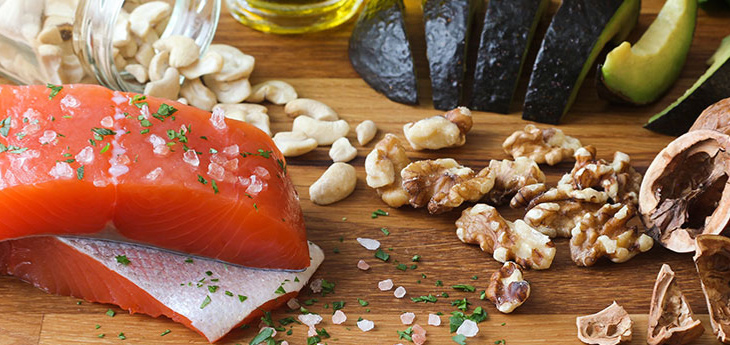Your heart is a very important muscle. The heart’s job is to pump blood and carry oxygen all throughout your body via a “highway” of blood vessels (arteries and veins). Following a few simple nutrition tips can help keep your heart strong and keep blood vessels clear of blockages. UC Davis Health registered dietitian Evy Miller gives you five easy steps to heart-healthy nutrition:
1. Choose healthy fats

Healthy fats are unsaturated fats (monounsaturated and polyunsaturated) and they help protect your heart. Generally, unsaturated fats come from plant sources. Examples include nuts, seeds, olives, plant-based cooking oils (olive, avocado, canola, safflower, etc.), and avocados. Omega-3 fats are another type of heart-healthy fat found in fatty fish (salmon, tuna, mackerel), flax seeds, and walnuts.
2. Limit your intake of saturated fats and trans fats

These fats cause your body to produce more bad cholesterol which can lead to deposits in your arteries. Saturated fats are found in animal products like butter, lard, whole fat dairy products, fatty meat, and poultry skin. Coconut and palm oils also contain saturated fats. Trans fats are healthy (unsaturated) fats that have been treated chemically to behave like bad (saturated) fats. When looking at an ingredient list, avoid foods that contain “hydrogenated” or “partially hydrogenated” oils.
3. Fiber is your friend
Fiber is found in fruits, vegetables, legumes (beans), and whole grains. Eat a rainbow of fruits and vegetables to support overall health. Limit your intake of white/refined grains. For example, choose brown rice over white rice; add beans and lentils your diet; experiment with whole grains like oats, barley, farro, spelt, and more. A higher fiber intake has been shown to help lower the bad cholesterol in your blood.
4. Limit added sugars
Added sugars are sugars added to foods to make them sweet. There are over 60 names for added sugars. Examples include sugar (white, brown), honey, molasses, maple syrup, corn syrup, high fructose corn syrup, agave, and more. Added sugars are commonly found in sugar-sweetened beverages (soda, punch, sweet tea), candy, cookies, cakes, pies, ice cream, granola bars, and sweetened coffee creamer. Women and children should get less than 6 teaspoons (24 grams) of added sugar per day. Men should get less than 9 teaspoons (36 grams) of added sugar per day.
5. Be active and move your body
Physical activity increases your good cholesterol (HDL). Good cholesterol is protective to the heart. Aim for a minimum of 150 minutes of physical activity per week. This is equal to 30 minutes, 5 days per week. Try to sustain any movement for a minimum of 10 minutes as a time. All activity counts: walking, biking, weight lifting, yoga, playing sports and more. Do an activity that you enjoy. Move your body to keep your heart healthy and happy.
Check out some resources from the American Heart Association:




